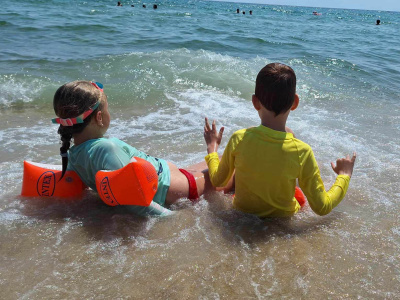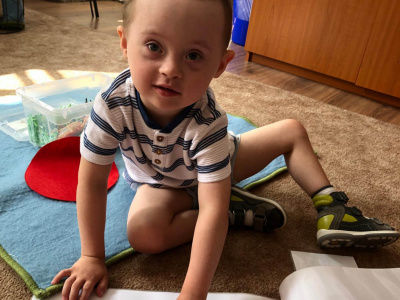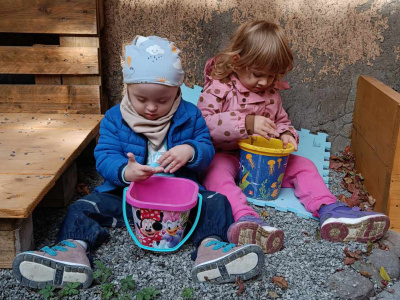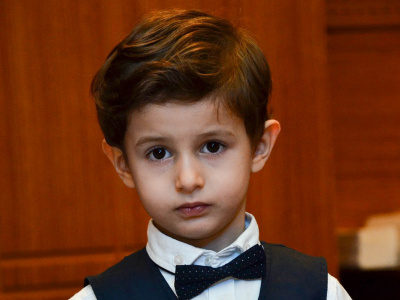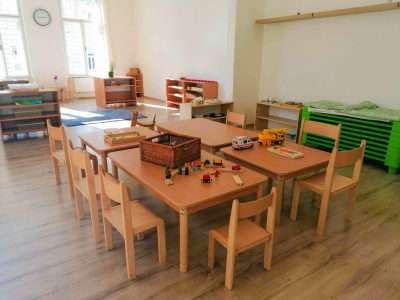Is there the kindergarten for Samko?
When we got out of the car after half an hour of driving, we were greeted by the friendly parents of five-year-old Samek. In a house 40 km away from Košice, fragrant coffee was waiting for us, and one would not have guessed that these nice hosts were solving almost unsolvable problems.
Samko is a "disconnected" autistic boy who was about to start kindergarten. But which one? There may be a kindergarten in the village where the family lives, but like most kindergartens, this one is sure to be apprehensive about accepting the boy into the class. As we get to know the boy better, we understand the principal's possible concerns. The child does not communicate, has never been worked with, does not understand instructions...
The family sought early intervention services some time ago, but the centre they first approached refused them support. Its staff didn't take kindly to an autistic child. They didn't have enough experience or knowledge...
When Samko was 5 years old the parents approached our collaborating counselling service, SSCPP, who in turn approached us. But to start working with a child and his family at such a young age unfortunately no longer brings the desired results.
So we try to instruct parents in what they could have mastered a long time ago. We teach them to connect to their child, to attract his attention so that he responds to them, to perceive and understand his needs more. And at the same time, together with them, we solve the topic of "nursery".
It would be ideal if the child could go to a special kindergarten in Košice. But even if they accept it there, who will wear it there? Dad works right in the village and is happy to have a job. Until now, the mother was at home with the child, she does not drive and could not take her son to the kindergarten 40 km away. As if that were not enough, the child has a special diet that no kindergarten will provide. What about that?
Early Intervention Center Košice, n.o. strongly perceives the problems with the placement of our small clients in kindergartens. We have been trying to move forward in solving this problem for several years.
Inclusion has been talked about for years, but the reality is that the kindergartens themselves are not yet sufficiently set up to accept a disabled child. So what is the solution?
We have opened a preparatory kindergarten since January 2023.
It should help children with disabilities learn to accept other children, teachers' instructions, function without their parents and acquire the skills needed in kindergartens. All this so that they have a better chance of being admitted to a kindergarten in accordance with their own abilities - to a regular or special...
But is that enough? The project is limited in capacity and is designed ideally for children, especially in preschool age, which Samko does not meet even if he lived in Košice. How to ensure that there are as few children as possible who do not receive support on time?
The fact that the child is not developing properly at an early age can be detected by the child's parent or pediatrician. If a parent suspects that something is wrong, they should notify the pediatrician and ask for the child to be screened. The latter then confirms or refutes the parent's suspicion that it could be autism.
However, screening at the age of 3+ is quite late for subsequent effective work with a child with a disability. In addition, few pediatricians currently perform screening. Therefore, as part of our First Years project, we started visits to pediatricians. We establish cooperation with them and talk about the need for early screening for children with at-risk development, about the need for support in the first years of a child's life...
Five-year-old Samko lives 40 kilometers from the nearest special kindergarten, and his parents do not have the opportunity to take him there. How did it end up with him?
The management of the catchment kindergarten in the place of residence decided to admit Samka to kindergarten. Although only for the exam - for an hour a day, but at least something. And how will it develop further?
The kindergarten management, in cooperation with the parents, begins to understand the specific needs of the child, manages to involve him in the collective and partly also in education, and the length of stay in the kindergarten will be extended. An ideal (almost unrealistic) case. Or the kindergarten assesses that this child does not belong in a regular kindergarten. This happens normally. And we would be back at the beginning of the journey…

